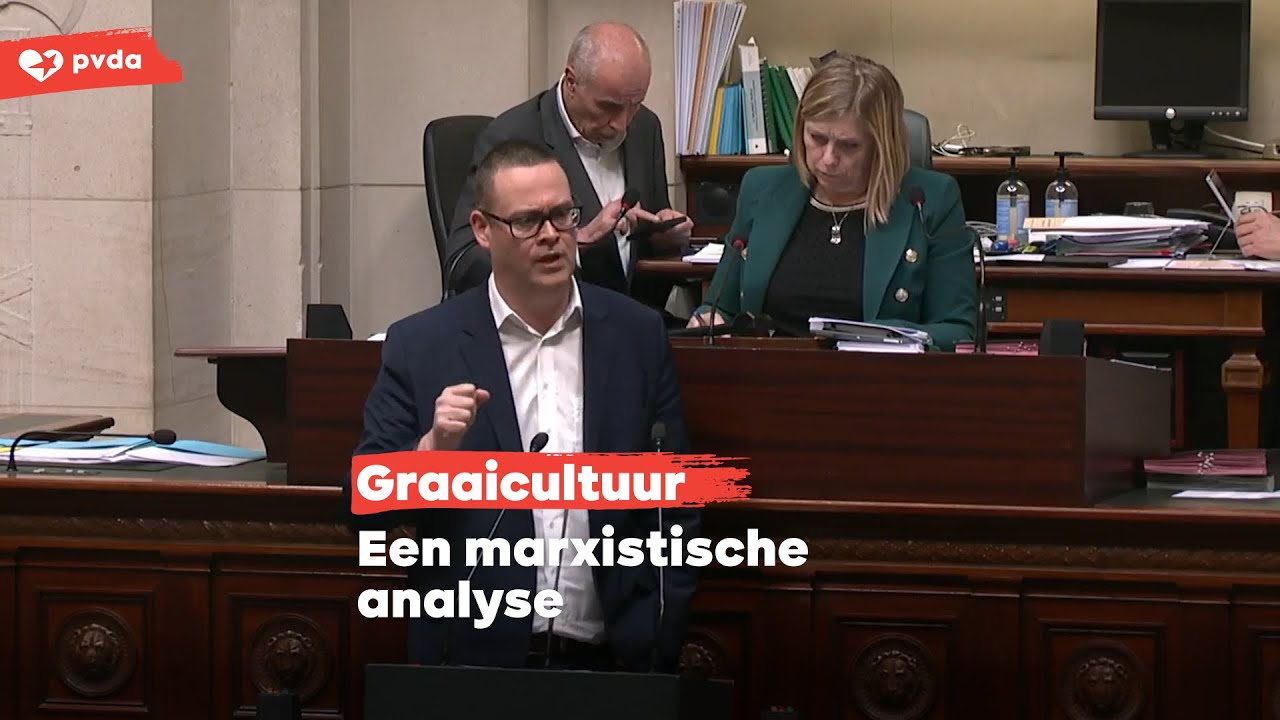Translation:
One of the arguments that often get used over here is that we could earn much more in the private sector and that’s why the private privileges (higher wages) must be applied to us as well. First, allow me to doubt about this statement when I look around the Parliament.
I think we should analyse the mechanism a bit closer, how why politicians in Belgium and Europe assume they should earn as much as corporate elites controlling capitalism. This mechanism that allows politicians to earn as much should be reviewed by an independent commision. I also want to use my time today to reply to the accusations of us being a populist party. No, we are not populists. We are marxists. That’s very different. Populism uses an analysis of the people against the elite. We marxists make an analysis of class in society. Wage labourers and independent contractors as a united front against the bourgeoisie who own the means of production. We don’t do populism, we do marxism.
But you asked the question: ‘how come marxists get so angry about politicians’ privileges?’ Because the labour movement, marxists, from the start were interested on this very crucial question: how do the economic elites make sure they control politics? The first ones who wanted to answer this question were Karl Marx and Friedrich Engels in their book ‘The origins of the family private property and the state’. I cite Engels: ‘In the most democratic system, the rich impose their power indirectly but surely. On the one hand in the form of direct and indirect corruption of politicians, on the other hand through a bond between government and the [stock] exchange.’ It’s very interesting to see that even then a debate was held about giving economic privileges to politicians. This is a sociological mechanism that doesn’t even relate to individual choices: Pierre Bourdieu discussed the ‘habitus’ greatly. The fact that politicians make 6000 euro a month leads to them becoming detached from the people they represent. A politician can vote for the wage index leap, like the right has done for example. Because politicians earn pensions of 9000 euro it is easy for them to lower the minimum pension. There is a very clear connection between the material basis of the politicans and the decisions they make. This is an important lesson from the labour movement. And that’s why we should analyse this decision in detail.
Thats why solutions from the labour movement are deemed ‘radical’. It has nothing to do with populism.
Karl Marx analysed the Paris Commune in his book ‘The Civil War in France’. He analyses why the labour movement, why the Paris Commune, took measurements against politicians. And I will list them here, because you will recognize some of them when you look at Labour’s party ideas.
In 1871 the proletariat rises up. For the first time in modern history, it defends her own demands instead of blindly following the bourgeoisie like during the revolution of 1789. In the Paris Commune of 1871 the proletariat, the sans-culottes, rise up and say: ‘We’re going to change the way politics decide society and here’s how we’re going to do it.’ Listen to these points, made in 1871 but still relevant today.
First rule of the commune: all politicians must live off of a labourer’s wage to stay connected to their economic reality. Second rule of the commune: all economic privileges attached to higher public figures’ positions will be cancelled. Third rule of the commune: all leaders of the commune can be held accountable or fired at all time. What a democracy! Fourth rule of the commune: elections with general voting rights with all candidates on equal footing. And, of course: a majority of the members of the commune is supposed to be a worker or acknowledged representative of the workers.
Six rules (mistake? as he lists only five) of the Paris Commune still relevant for today’s debate and democratic struggle of European and Belgian proletariat. There, essential rules have been made to develop real democracy. To develop a democracy in which the workers, who produce our country’s wealth, because let us stop thinking our elites are the ones producing the wealth. Have you ever planted a Euro into the ground waiting for something to happen? Nothing will happen. Capital does not create capital. It is only the labour that procudes wealth and value.
And that’s why the power needs to be returned to the workers. That’s what it is about. It’s not about populism, about surfing on the wave of actuality. There is need for a detailed analysis of the powerful class mechanisms who are responsible for making the politicians a prey for the wealthiest. These mechanisms should be studied by the commission. What made you decide, comrades, without actual discussion taking place about if an exception should’ve been made about the Wijninckx-cap. A debate didn’t happen, why? Because everyone present agreed. Everyone agreed: we work hard and we should earn more than what our laws give the working class. This ideological consensus is so powerful that we should analyse it so that it doesn’t happen again. We are backtracking, not making progress. Every time a Labour Party discovery, or a press discovery gets revealed, everytime a new mechanism gets discovered: ‘we didn’t know about it!’ I believe you didn’t knew. I believe. You didn’t know, because it was the standard for you. That’s why we should, at all cost, analyse these mechanisms. These mechanisms that make our country undemocratic, make our country not provide for our working class.
deleted by creator


